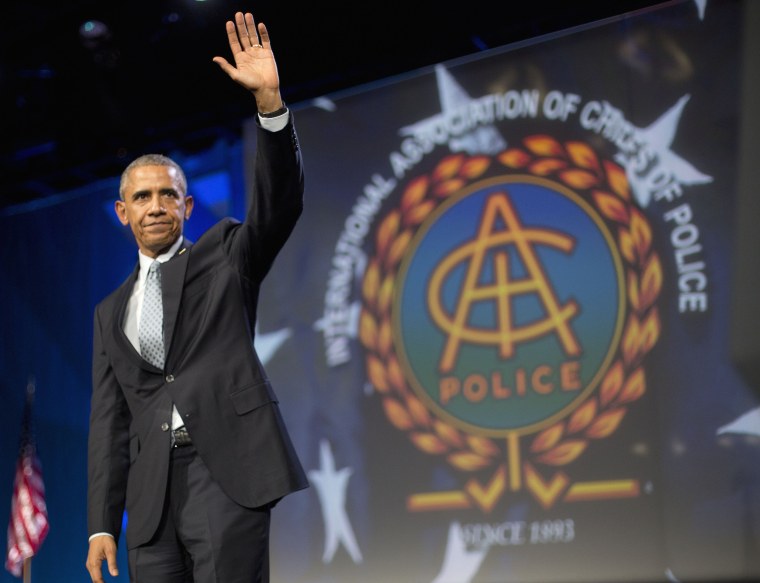President Obama tried to walk a fine line between supporting police officers and acknowledging strained relations, particularly with communities of color, during remarks to the International Association of Police Chiefs in Chicago.
During those remarks, he focused on bridging the divide between police and communities, criminal justice reform and another push for new gun safety laws, which he says will keep communities and law enforcement safer.
"I reject any narrative that seeks to divide police and communities they serve; I reject the story lines that say there is 'us' and 'them,' he told the audience of 2700 people.
Later, the president mentioned incidents in Ferguson and New York where police killed unarmed black men, and acknowledged there would be differing opinions if he polled everyone in the room.
"With today's technology, if just one officer does something irresponsible, the whole world knows about it moments later," Obama said.
And while he admitted that effective police work "rarely makes it on the evening news," he asked the group to concede "you know as well as I do, that the tensions in some communities, the feeling that law enforcement isn't always applied fairly, those sentiments don't just come out of nowhere."

Richard Beary, President of IACP and Chief of Police at the University of Florida, said overall immediate reaction to Obama's comments was positive.
"It was important the president came and talked to law enforcement and said he understands the critical role they play. The officers needed to hear that," Beary said by phone right after the speech. He acknowledged morale has been low and stressed there are cops out there doing great things everyday that don’t make the headlines.
"Law enforcement is not trying to separate itself from the community," Beary said. "The vast majority of law enforcement abide by the oath they took."
Related: As Violence Spikes in Some Cities, Is 'Ferguson Effect' to Blame?
President Obama made no mention of FBI Director James Comey or any specific reference to his recent remarks about a "chill wind" police are facing in the wake of Ferguson.
But he did lay out that violent crime rates are nearly as low as they were last year. The President also met with the spouses and children of law enforcement officers who were killed in the line of duty as well as families of victims of gun violence in Chicago.
"But, I could not honestly tell them that our country has done everything we could to keep this from happening again," the President told the audience about the gun violence.
His remarks included no specific new policy proposal on gun safety, but he promised to continue to push Congress to act and refuted the notion he’s out to take people’s guns away.
And he listed some alarming statistics: Thirty-two cops have been shot and killed this year. At least a dozen children have been shot and killed this month. About 400,000 Americans have been killed by guns since 9/11. That’s the entire population of Cleveland or Minneapolis.
No new major legislation has been initiated since 2013, when the Senate rejected a bill to strengthen background checks for gun purchasers in the wake of the shootings in Newtown, Connecticut. Meanwhile White House advisors continue to peruse existing law for the possibility of more executive actions.
The president also highlighted sentencing reform, where he said it’s not a "bleeding-heart attitude" to take another look and make sure the "punishment fits the crime."
He mentioned societal issues from education, drugs and lack of jobs as contributors and lamented that the problems are laid at the feet of law enforcement because "the rest of us aren't willing to face or do anything about it."